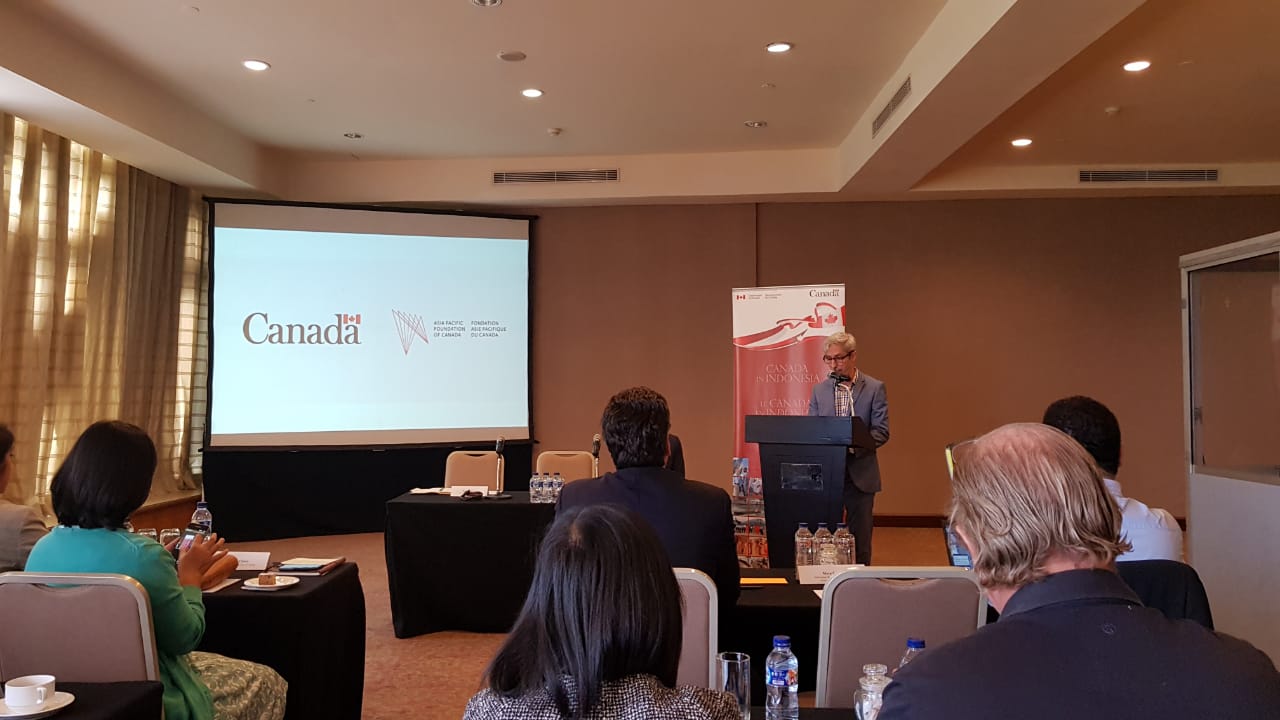ANGIN was invited to attend a workshop by the Asia Pacific Foundation of Canada (APF Canada): Fostering a Robust MSME Workforce in Indonesia. The workshop at the JW Marriott in Jakarta featured 4 presentations (three of which had follow up panels), and a break-out session at the end. John Summerball from the Embassy of Canada opened the event with an introduction to Canadian inititatives in development and trade across the world. He even referred to ANGIN’s work with Canada and UNDP!
The first presentation was titled MSMEs and Human Capital: Findings from an Indonesia National Survey. APF Canada’s project specialist, Amar Nijhawan, presented their findings from a survey of 448 MSMEs around Indonesia. Nijhawan began with a breakdown of Human Capital, defining it to have four different components: Capacity, Deploy, Development, and Knowledge.
The presentation’s theme centered around Human Capital and began with a strong point: education increases capacity, but it is experience that actually increases a person’s human capital. The survey (which will be released soon) found that key HR issues were in lack of a skilled workforce and employee absenteeism—finding talent. Key findings surrounded a large lack of access to support and missing information about existing programs and policies available to MSMEs.
The second presentation was by Dr. Dominic Lim, an Assistant Professor from the Ivey Business School at the University of Western Ontario. It was titled Human Capital MSMEs in APEC Developing Economies: Interactive effects of Individual-Level Factors and Institutional Conditions.
Dr. Lim walked through the indicators of educational success in entrepreneurship and analysed the different indicators, including APEC, APEC developing, and the Global Entrepreneurship Monitor. His finding showed different relationships between the levels of education. Essentially, high education and high entrepreneurial knowledge made up for a lack of government support. Dr. Lim also made an interesting point, saying that Entrepreneurship is a process, and execution is about putting together the resources. A panel discussion followed the two presentations as Nijhawan and Lim discussed the landscape.
Rahmasari Istiandari and Muhammad Rizqy Anandhika from ERIA (Economic Research Institute for ASEAN & East Asia) spoke about Gender Roles in Small and Micro Business Development in Indonesia. ERIA looked into different studies surrounding women in MSMEs, working with an especially large study by the BPS (Statistics Indonesia) of 58,290 firms in the manufacturing industry, as well as other studies around the same issues and industry. One of their findings centered around the idea that female work was sometimes more necessity driven than opportunity driven.
The ensuing panel with Maya Juwita from the Indonesian Business Coalition for Women Empowerment covered these issues, as well as differences in international definitions of SMEs and the definition in Indonesia. Another interesting discussion point centered around how women quit the workforce because of family commitments and other gender-specific issues.
The final presentation and panel featured Alexander Capri, Senior Fellow at the National University of Singapore Business School). Developing Human Capital for MSMEs in Indonesia: Impact of Digital Technology on MSMEs. The presentation investigated 8 startups and how they used the digital economy to build their businesses. Capri discussed key points on how to better enable firms to use technology—from infrastructure to awareness, and legal aid to digital readiness. The final session was a break-out session on Bridging the Gap Between Policy and Research.
ANGIN took away some great insights from the studies conducted by APF Canada and its partners, and looks forward to further collaboration.





